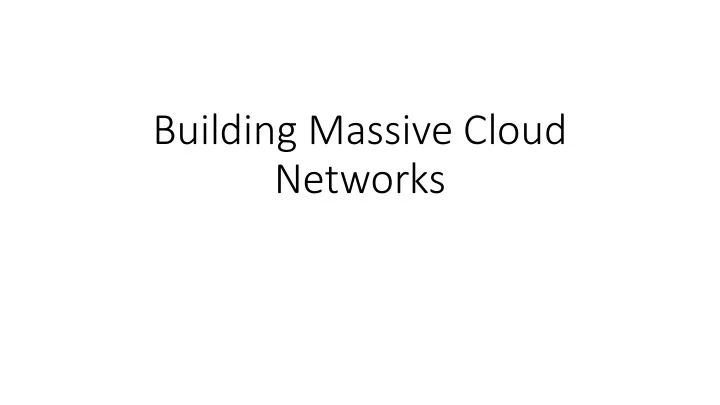

Building Massive Cloud Networks
Image from Microsoft Azure
https://www.nytimes.com/interactive/2019/03/10/technology/internet-cables-oceans.html
HUGE data center networks (DCN) • Thousands of routers • Hundreds of thousands of servers
Google’s Oregon DC
Inside a Google DC • https://www.google.com/about/datacenters/inside/streetview/
DCN topologies • Big iron à Commodity switches • 1 Gbps à 10 Gbps à 40 Gbps à 100 Gbps (soon) • Copper à Fiber
Oversubscription ratio • Ratio of bisection bandwidth across layers of hierarchy • Key design parameter that trades-off cost and performance • Higher oversubscription = lower cost but higher chance of congestion
DCN routing • Spanning tree (L2) à OSPF/ISIS à BGP
Backbone • Provides global connectivity to DCs • May also have two backbones • A “public” backbone to connect to the outside world • A ”private” backbone for inter-DC connectivity • Uses transcontinental and transoceanic fiber cables • Routing: ISIS/OSPF à MPLS à Centralized control (SDN)
MPLS – Multi Protocol Label Switching • Can explicitly program paths -- tunnels • Allows taking non-shortest paths • Auto-bandwidth: Constrained-shortest paths first (CSPF) • Fully distributed computation • Estimate demand • Find shortest path(s) that can fulfill the demand
SDN – Software Defined Networking • Centralized computation of forwarding tables • Compute “optimal” paths outside of the network • Based on estimated load; also factor in application priorities
Using the cloud • Use a software service (e.g., email) -- SaaS • Use application building blocks -- PaaS • Launch VMs – IaaS • Build virtual networks • Provides the same abstraction as physical networks but with virtual devices
Connecting to the cloud • Public Internet • VPN from your physical resources to the cloud • BGP peering • E.g., Amazon Direct Connect
The last ten years of the cloud Scale, scale, scale … (mostly) Relatively small conceptual shifts • Lot of automation – minimize “snowflakes” and “fat fingers” • Troubleshooting: Find needles in haystack • E.g., Everflow [SIGCOMM ‘15], CorrOpt [SIGCOMM ‘17] • Centralized control of resources • E.g., SWAN [SIGCOMM ‘13], Footprint [NSDI ‘16] • Low-latency technologies, e.g., RDMA
Bigger shifts are coming Verification • E.g., Batfish [NSDI ‘15], Minesweeper [SIGCOMM ’17] High-level synthesis • E.g., Propane [SIGCOMM ’16, PLDI ‘17] Programmable NICs and switches New physical layers • E.g., ProjecToR [SIGCOMM ‘16], RAIL [NSDI ‘17] Edge computing Tighter coupling with applications ….
Recommend
More recommend